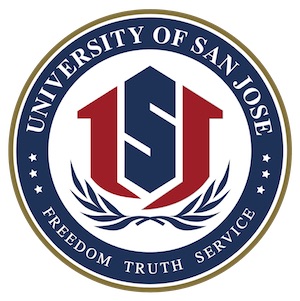On May 9, 2024, the University of San Jose (USJ) and Jiangxi Software Vocational and Technical University jointly hosted the “2024 USJ Pioneer Silicon Valley AI Forum – AI and Vocational Education Development” successfully at USJ in San Jose, USA. The forum was attended by Dr. Fangping Chen, Chairman of Jiangxi Software University; Dr. Like Zhuang, President of Jiangxi Software University; Dr. Claude Wang, Founding President of USJ; Dr. Tony Hu, Trustee of Patten and LU; Dr. Bin Li, Vice President of USJ; Dr. Tom Tafolla, Vice President of USJ; Richard, Distinguished Professor and Director of Patten International Education; Dr. Tilly Feng, Visiting Professor at Stanford; Dr. Wenzhong Liu, Distinguished Scientist at Amazon; Dr. Xin Ai, Mentor of Innovative Thinking and Design in Silicon Valley; Dr. Jefery Wei, Chairman of the Silicon Valley Venture Capital Forum of the University of Science and Technology of China; Ms. Yingzi, President of the Jiangxi Association of California; Ms. Lilly, Executive President of the Jiangxi Association of California; Ms. Gao Xiang, Chairwoman of the Hebei Chamber of Commerce of California; Mr. Yan Wei, Secretary-General of the Hebei Chamber of Commerce of California; Mr. Henry Deng, Vice President and Secretary-General of the Sichuan Chamber of Commerce of California, and nearly 100 other attendees both online and offline.
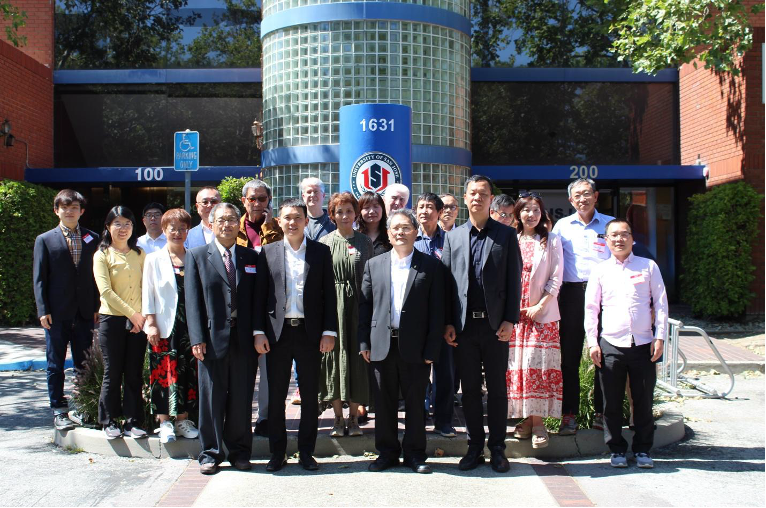
The forum focused on “AI and Vocational Education Development,” aiming to explore the impact of artificial intelligence on teaching methods, teaching content, social enterprise evaluation, organizational forms of social enterprises, personal thinking design, and efficient international cooperation in future vocational education. It also aimed to discuss possible responses to these developments. Dr. Bin Li, Vice President of USJ, chaired the meeting. Dr. Claude Wang and Dr. Fangping Chen delivered the opening speeches, and Dr. Like Zhuang along with six other keynote speakers shared their insights. The forum was a resounding success!
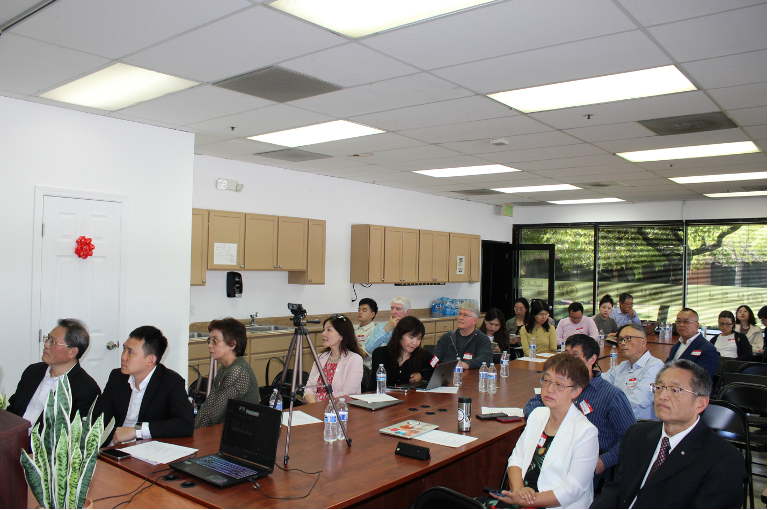
Part 1: Forum Background
1. The Establishment of USJ-Jiangxi Software Silicon Valley Graduate School Marks a New Era in Sino-American Higher Education Cooperation
On May 8, 2024, the University of San Jose (USJ) and Jiangxi Software Vocational and Technical University signed a cooperation agreement to jointly establish the “USJ-Jiangxi Software Silicon Valley Graduate School.” This event signifies a new chapter in Sino-American educational cooperation, particularly in the internationalization of Chinese private education.
Chinese and American higher education have undergone various phases, from the “study abroad wave” to the “cooperative education wave,” and now to the “AI employment wave.” The USJ-Jiangxi Software Silicon Valley Graduate School will utilize “digital twin technology” and AI assistance to synchronize the content of Sino-American higher education. Chinese students can complete “American-style education” in China and then have the opportunity to directly start businesses and find employment in the United States. This transition from the “study abroad wave” to the “employment wave” indicates that the USJ-Jiangxi Software Silicon Valley Graduate School will lead innovative international cooperation models, garnering attention from all sectors of society.
2. AI Profoundly Influences Educational Development, Leading to New Educational Models
Artificial Intelligence (AI), exemplified by applications like ChatGPT, is rapidly developing and bringing profound changes to course design, teaching, exams, and learning methods. The emergence of “digital teachers,” “twin teachers,” “twin classrooms,” and “digital flipped classrooms” is transforming teaching methods and teacher-student relationships. This new educational landscape is worth our active attention.
3. Career Development in the Age of Large Models Presents New Opportunities and Challenges
The development of large models provides a “whole-process perspective” for talent cultivation and selection. “Resumes” have evolved from simple personal summaries to comprehensive “descriptions” of personal growth experiences. Big data and large models can assist in “talent evaluation,” “talent analysis,” and “talent prediction,” facilitating the selection of talent by hiring institutions. These new opportunities and challenges offer a fresh perspective on talent cultivation and the development of vocational education for university students.
At the same time, in the AI era, new enterprise forms, organizational structures, evaluation methods, and personal thinking development are emerging. These topics are relevant to vocational education in the AI era and are worthy of discussion and consideration by professionals and vocational education practitioners.
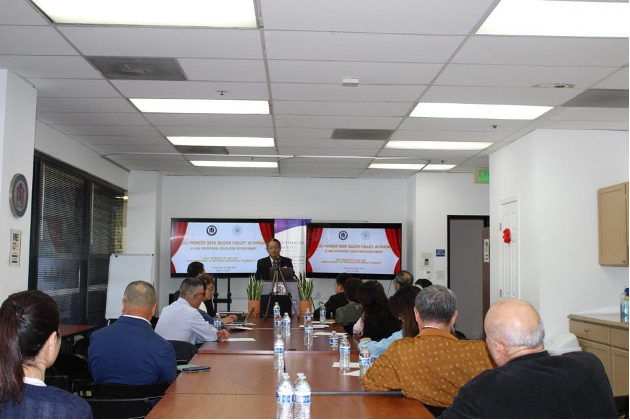
Event Host
Dr. Bin Li, Vice President of USJ, holds a Master’s degree in Computer Science from Stanford University and a Bachelor’s, Master’s, and Ph.D. in Science from Tsinghua University.
Part 2: Opening Speeches
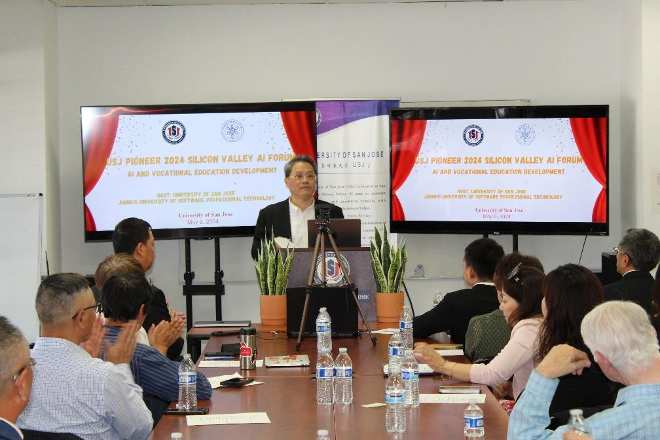
“The collaboration between USJ and Jiangxi Software Vocational and Technical University to jointly establish the Silicon Valley Graduate School is a milestone in Sino-American educational cooperation, particularly in the internationalization of Chinese private education.”
— Opening Speech by Dr. Claude Wang, Founding President of USJ
【Dr. Claude Wang, Founding President of USJ, Founder and Chairman of Gocean (Gosvea) Education Group, holds a Bachelor of Science from Tsinghua University and a Doctorate in Management from Peking University.】
In his opening speech, Dr. Claude Wang provided a detailed introduction to the background of the event and the deep collaboration between USJ and Jiangxi Software Vocational and Technical University to jointly establish the Silicon Valley Graduate School, marking a milestone in the internationalization of Chinese private education. Claude elaborated on the development and current status of USJ, noting that the university currently offers master’s degrees in two disciplines. Leveraging Silicon Valley resources, USJ is actively promoting the development of international educational cooperation between China and the United States. Furthermore, USJ is committed to providing comprehensive services for Jiangxi Software University students, including enhancing their international bachelor’s, master’s, and doctoral degrees, offering international study tours, and supporting their international employment and entrepreneurial development.
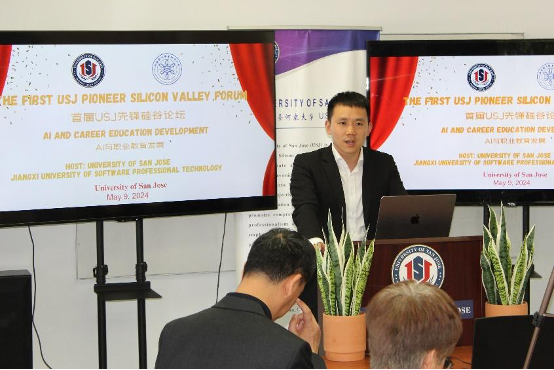
“International development is Jiangxi Software University’s unwavering development strategy. By connecting with Silicon Valley’s top technology and education resources and co-establishing the Jiangxi Software Silicon Valley Graduate School with USJ, we aim to serve the internationalization of students’ academic pursuits, employment, and entrepreneurship. This will promote innovative models for the internationalization of Chinese private education and foster the development of innovative Sino-American international education cooperation models.”
— Opening Speech by Dr. Fangping Chen, Chairman of Jiangxi Software University
【Dr. Fangping Chen, Ph.D. Candidate, EMBA from Tsinghua University Wudaokou School of Finance, General Manager of Pioneer Software Group, Chairman of Jiangxi Software Vocational and Technical University, and Vice President of the Jiangxi Youth Entrepreneurs Association】
Dr. Fangping Chen, on behalf of the host institution Jiangxi Software University, delivered a speech. He introduced the main body, purpose, and development process of Jiangxi Software University, highlighting its scale of over 20,000 enrolled students. Dr. Chen then elaborated on the “Jiangxi Speed” in building the university’s Jinggangshan campus, showcasing the university’s efficient management and development model. Finally, Dr. Chen emphasized the significance and future prospects of establishing the Silicon Valley Graduate School. He reiterated that international development is Jiangxi Software University’s unwavering strategy. By leveraging Silicon Valley’s premier technology and education resources and co-establishing the Jiangxi Software Silicon Valley Graduate School with USJ, the university aims to support the internationalization of students’ academics, employment, and entrepreneurship, thereby advancing innovative models for the internationalization of Chinese private education and Sino-American international education cooperation.
Part 3: Guest Speeches on AI and Vocational Education Development
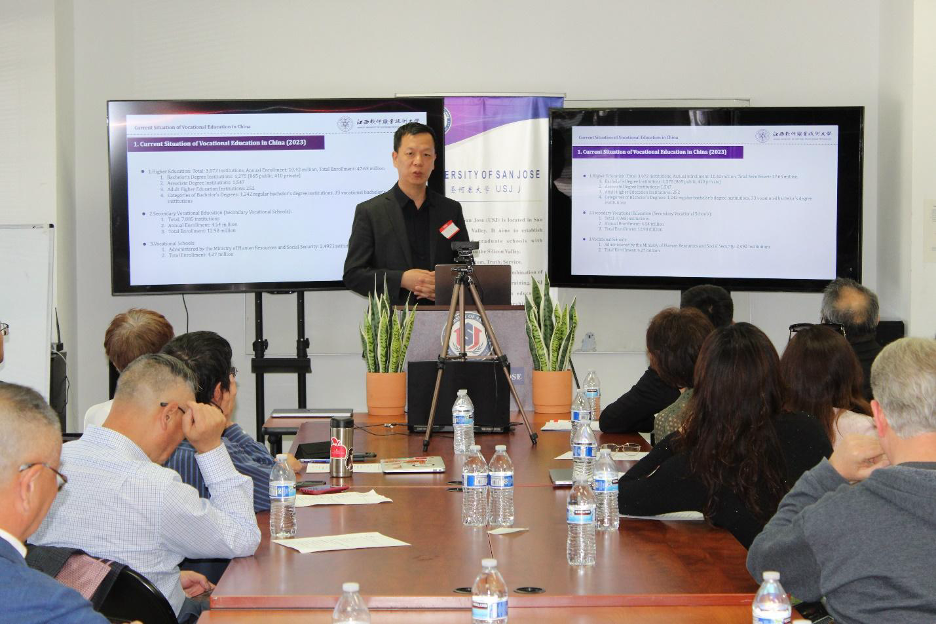
“AI Empowering Vocational Education: Vocational Education Requires Heart-to-Heart Inspiration”
— Speech by Dr. Like Zhuang, President of Jiangxi Software University
Topic: “AI and Innovation Research and Exploration in Chinese University Vocational Education: A Case Study of Jiangxi Software University”
【Dr. Zhuang, Professor, IT Expert, Postdoctoral Fellow from Tsinghua University】
Dr. Zhuang began his speech by introducing the current state of vocational education in Chinese universities, explaining the relationship and integration between vocational education and general education in China. He then shared Jiangxi Software University’s innovative research and exploration efforts, including the establishment of the nation’s first blockchain school and specialized programs, which enhance students’ employability through industry-education integration and practical training models. Finally, he discussed how teachers and students should respond in an AI environment. Students need to adapt quickly to new technological developments and be willing to experiment.
Dr. Zhuang presented three views on education and teaching. First, theoretical technology is fundamental. Teachers must master new theories and technologies to improve teaching methods and tools. Second, love is essential. Teachers should use great love to fulfill the essence of education—imparting knowledge, teaching, and solving doubts. Third, personalized educational innovation is the direction. He detailed examples of Jiangxi Software University’s use of AI technology for educational innovation. He emphasized that through AI integration, the university can now provide more personalized and adaptive teaching solutions, significantly enhancing students’ learning efficiency and their adaptability to future workplaces. Particularly in software and information technology education, AI applications have helped students make significant progress in understanding complex concepts and practical operations.
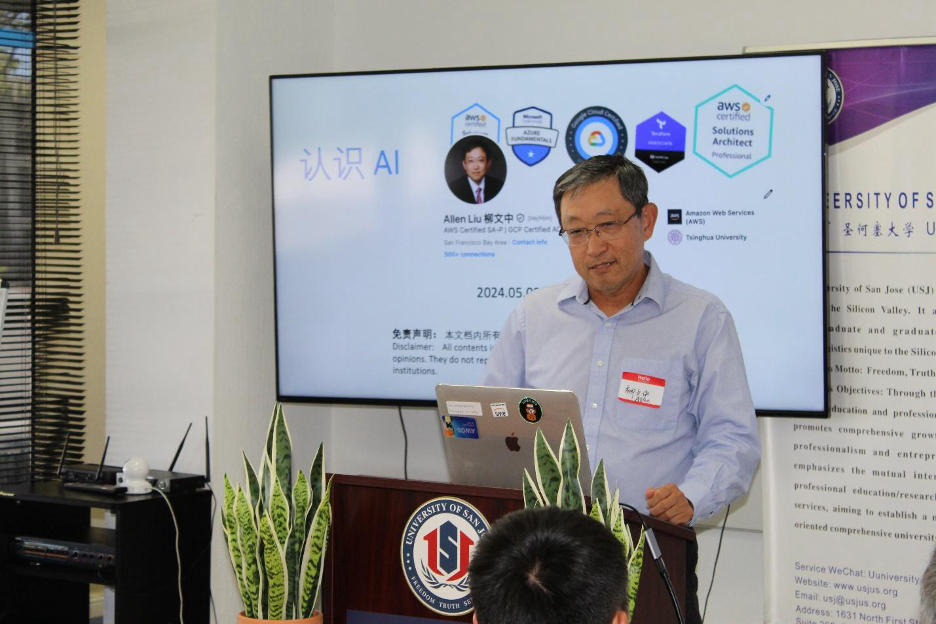
“The Source of AI Development Comes from the Openness of the Human Mind; A Chance Historical Change in Movable Type Printing Brought About Earth-Shaking Changes for Humanity.”
— Speech by Wenzhong Liu, Distinguished Professor at USJ
Topic: “The Development of AI Technology in Silicon Valley”
【 Dr. Wenzhong Liu, Master’s from Tsinghua University, Amazon AI Scientist, Renowned AI Expert in Silicon Valley】
Professor Liu analyzed the development history and technical pathways of AI. He explained how the invention of Gutenberg’s movable type printing technology led to the widespread distribution of the Bible, sparking human contemplation of geocentrism and heliocentrism, which in turn led to the Age of Exploration and the creation of glass. This paved the way for Galileo’s heliocentrism. Galileo used glass to create the Galileo telescope and later the microscope, triggering the Scientific Revolution. This progression brought forth Newtonian mechanics (Newton’s First Law, Newton’s Second Law, and Newton’s Third Law), eventually leading to Einstein’s general relativity and quantum mechanics, thus initiating the modern technological revolution, including today’s AI revolution. The source of AI development lies in the openness of the human mind. A chance historical change in movable type printing brought about earth-shaking changes for humanity. In the AI era, vocational education must focus on inspiring students’ minds to achieve innovative development.
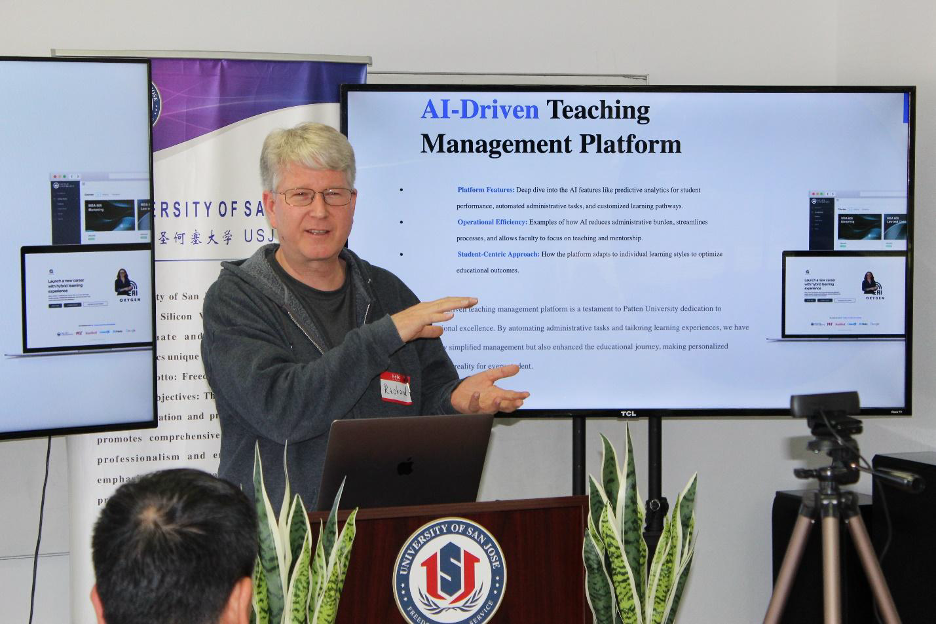
“AI Brings Twin Digital Technology, and Twin Digital Classrooms, Twin Digital Teachers, and Twin Digital Teaching Scenarios Will Emerge Endlessly. Online Vocational Education is Facing Great Development. With the Same Teachers and Lesson Plans, Each Student Receives Different Teaching Materials Through Twin Digital Technology and AI.”
— Speech by Distinguished Professor Richard, Head of Patten International Education
Topic: “Vocational Education and the Development of the Patten Online Model”
【 Distinguished Professor Richard, Head of Patten International Education, Silicon Valley International Education Expert】
Professor Richard Thornton delved into how twin digital technology is revolutionizing vocational education. By creating virtual learning environments, educational institutions can provide experiences that are almost as real as hands-on practice, which is especially important for vocational fields that require high levels of practical skills. Twin digital technology not only enhances students’ learning experiences but also significantly improves the effectiveness of remote education.
Patten has surpassed traditional online education models by using AI technology to establish immersive teaching scenarios. By making complex vocational education scenarios available online through AI and twin digital technology, Patten achieves synchronous teaching in diverse environments. AI brings twin digital technology, leading to the emergence of twin digital classrooms, twin digital teachers, and twin digital teaching scenarios. Online vocational education is poised for significant development. With the same teachers and lesson plans, each student receives different teaching materials through twin digital technology and AI, thereby improving student satisfaction with the teaching process.
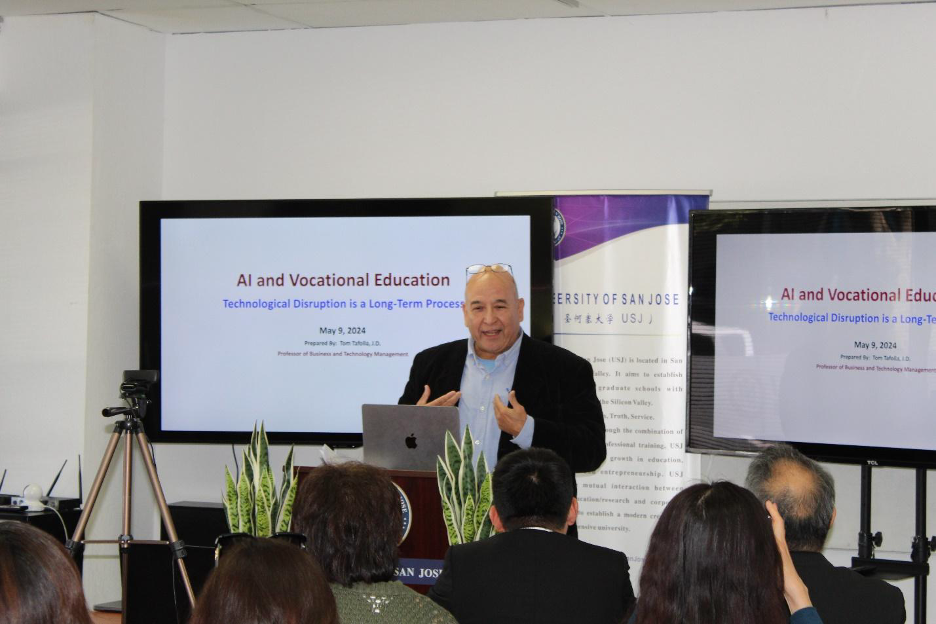
“Vocational Education Cannot Be Separated from Internationalization; Students’ Employment Training and Skills Enhancement Also Depend on International Contexts. The International Vocational Education in Silicon Valley is an Important Reference Model for Us.”
— Speech by Dr. Tom Tafolla, Professor and Silicon Valley Management Expert
Topic: “International Development of Vocational Education in Silicon Valley”
【 Dr. Tom Tafolla, Professor, Vice President of USJ, Renowned Silicon Valley Corporate Management Expert】
Professor Tom Tafolla introduced the development of international education and vocational education in Silicon Valley, analyzing Silicon Valley’s unique advantages in vocational education development. Professor Tom highly praised the establishment of the USJ-Jiangxi Software Silicon Valley Graduate School, noting that choosing Silicon Valley as the destination for collaboration is a very important and correct decision. Utilizing AI technology to achieve synchronous classroom teaching between USJ and Jiangxi Software University and helping Jiangxi Software students with international development are all excellent initiatives.
Professor Tom believes that vocational education cannot be separated from internationalization. Students’ employment training and skills enhancement also depend on international contexts. The international vocational education in Silicon Valley serves as an important reference model for us.
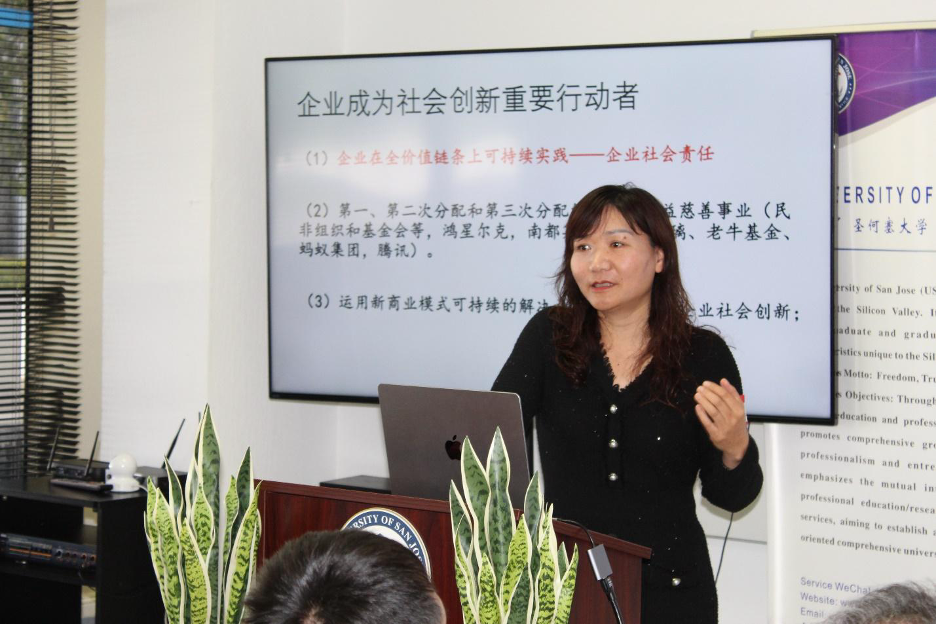
“In the AI era, the main channel for student employment is social enterprises. AI helps social enterprises achieve great development. Emphasizing the assessment of social enterprises’ social responsibility and corporate value judgment is an important choice for improving the quality of vocational education employment.”
— Speech by Dr. Tilly Feng, Visiting Professor at Stanford and Renowned Expert in Social Corporate Responsibility
Topic: “AI Impact: Assessment of Social Corporate Responsibility”
【Dr. Tilly Feng, Visiting Professor at Stanford, Associate Professor of Management, Master’s Supervisor, Renowned Expert in Social Corporate Responsibility】
Dr. Feng analyzed the crucial role of social enterprises in promoting vocational education development in the AI era and how AI assists in the growth of social enterprises. AI can identify educational needs and career development trends by analyzing big data, enabling educational institutions to more effectively adjust their curricula to meet market demands. Professor Feng also emphasized the importance of balancing social responsibility and commercial success for enterprises.
Professor Feng believes that the assessment of social responsibility is a vital means of recognizing corporate value. AI provides new assessment methods, offering students positive and effective paths for future career development and enterprise selection.
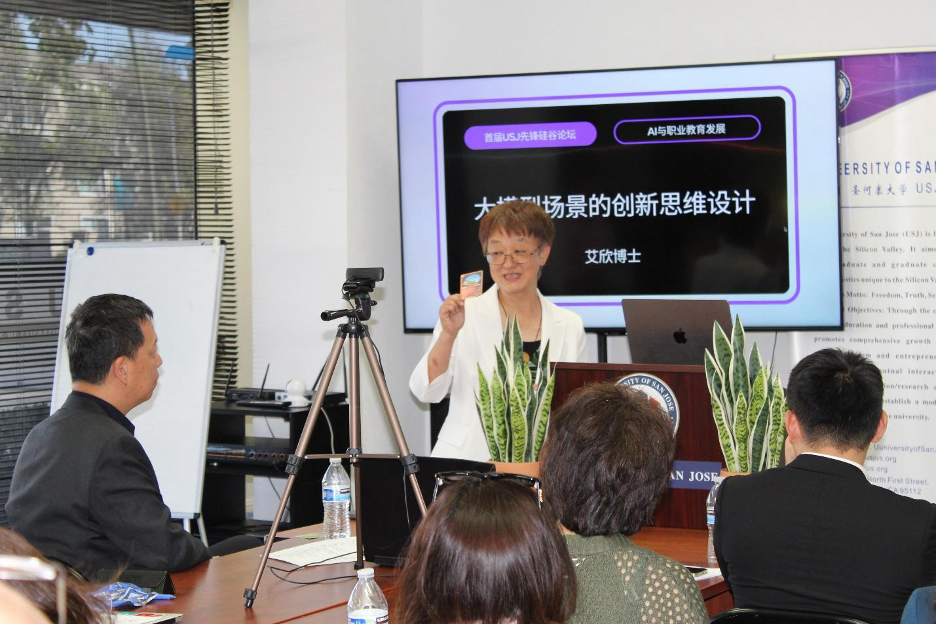
“In the AI era, students’ skills are divided into hard skills and soft skills. Hard skills may be quickly replaced by AI, but soft skills, especially innovative thinking and design, are irreplaceable by AI. These are crucial soft skills for students’ career development.”
— Speech by Dr. Xin Ai, Distinguished Professor at USJ, Expert in Innovative Thinking and Design in Silicon Valley, and Startup Mentor
Topic: “AI and Innovative Thinking Design”
【Dr. Xin Ai, Distinguished Professor at USJ, Silicon Valley Startup Mentor, Stanford Innovative Thinking Course Instructor, Former IBM Scientist, Renowned Expert in Innovative Thinking in Silicon Valley】
Dr. Xin Ai, whose name coincidentally is “AI,” is a true AI expert in Silicon Valley. Dr. Ai discussed the role of AI in educational development, particularly its potential in promoting students’ innovative thinking and skill development. He analyzed how AI helps customize personalized learning plans and enhances educational outcomes through simulation and prediction technologies. AI has not only changed the way education is delivered but also brought unprecedented opportunities to vocational education.
Dr. Ai highlighted the importance of using AI for training innovative thinking in complex data environments and shared strategies for implementing large models and data analysis techniques in teaching. His speech revealed how AI plays a critical role in solving complex problems and cultivating future leaders.
Dr. Ai believes that in the AI era, students’ skills are divided into hard skills and soft skills. Hard skills may be quickly replaced by AI, but soft skills, especially innovative thinking and design, are irreplaceable by AI. These are crucial soft skills for students’ career development.
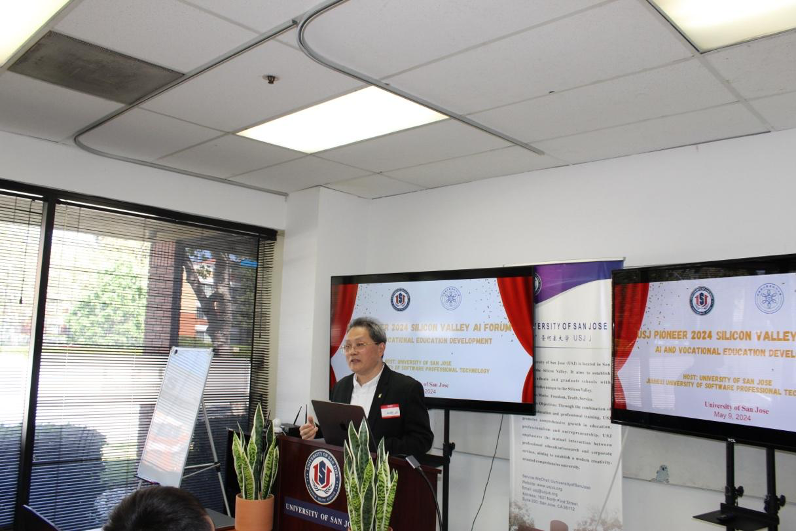
“In the AI era, enterprise organizational innovation has achieved great development, and the public-private hybrid model is an important form. OpenAI is not a traditional corporate structure; it is a ‘community model + limited liability company model,’ marking the development direction of future corporate structures.”
— Speech by Dr. Claude Wang, Founding President of USJ, on “Innovative Development of Enterprise Organization in the AI Era: From OpenAI to ICCPRA”
【Dr. Claude Wang, Founding President of USJ, Founder and Chairman of Gocean (Gosvea) Education Group, Bachelor of Science from Tsinghua University, Doctorate in Management from Peking University】
Dr. Claude Wang first analyzed the changes in enterprise organizational boundaries and the characteristics of social development in the AI era, noting that the community economy is facing great development. He then discussed the evolution of community economy theory and its main characteristics. Third, Dr. Wang examined the operating model of OpenAI: OpenAI OPO and OpenAI LP, their relationship, characteristics, and development. Fourth, Dr. Wang analyzed the development model of ICCPRA (International Community CPR Alliance): ICCPRA NPO and AllCPR Limited Partnership.
Dr. Wang believes that the enterprise organizational changes brought about by the AI era, specifically the “PP model” (Public Service + Private Operation), are important characteristics of future innovative and entrepreneurial enterprises. Vocational education must pay attention to the new meaning and operation methods of modern enterprises, including decision-making, business process optimization, and customer relationship management. Vocational education needs to develop in sync with these technological pathways, management concepts, and application scenarios to cultivate innovative talents capable of adapting to these changes.
This forum showcased the forefront of AI technology applications in the education field, analyzed the inevitability of the international development of vocational education, and discussed the impact of teaching methods, teaching content, social enterprise evaluation, social enterprise organizational forms, personal thinking design, and efficient international cooperation on vocational education. It also shared possible response methods for the future of vocational education. AI technology will continue to play an important role in the global vocational education field, promoting high-quality international development of vocational education.
Part 4: Welcome Dinner
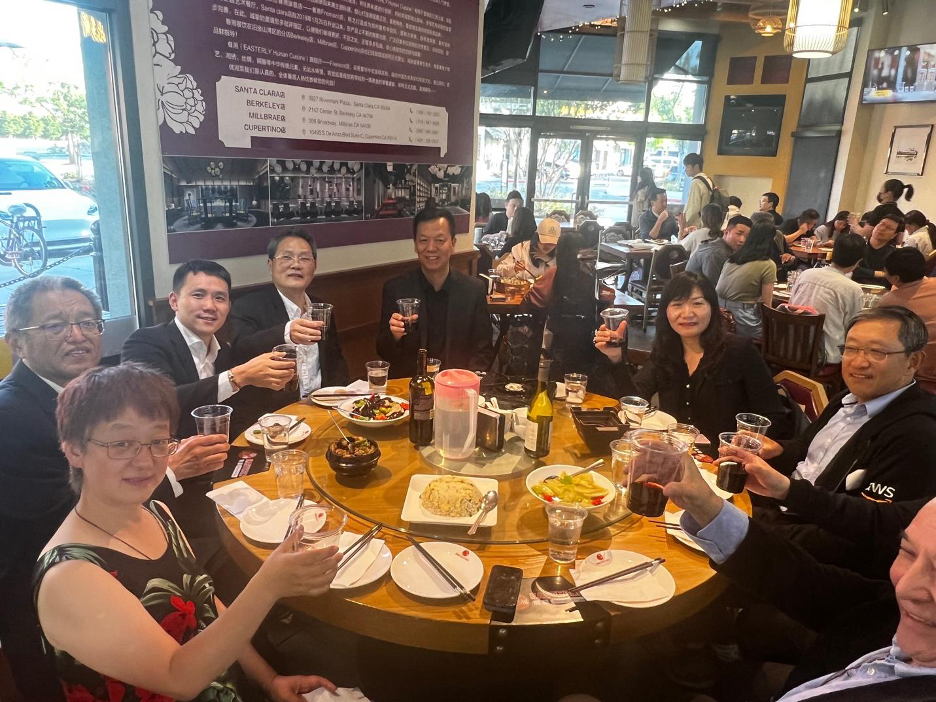
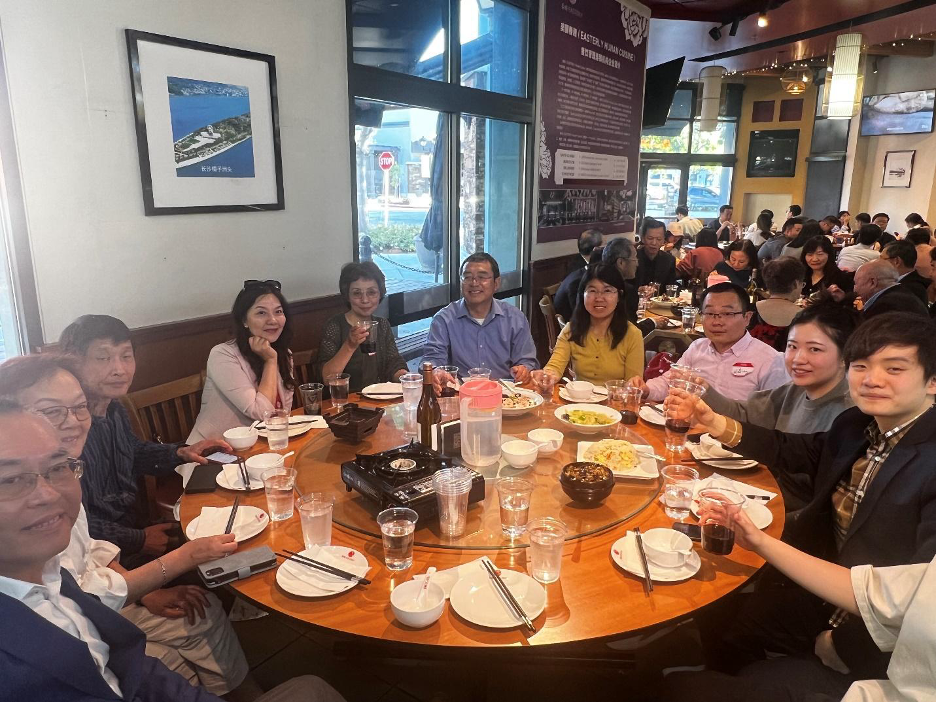
On the evening of May 9, 2024, some special guests gathered for a unique welcome dinner in the Bay Area, bringing the celebratory atmosphere of the forum to its peak. The event was a great success, and everyone eagerly looks forward to the next “USJ Pioneer Silicon Valley Forum”!
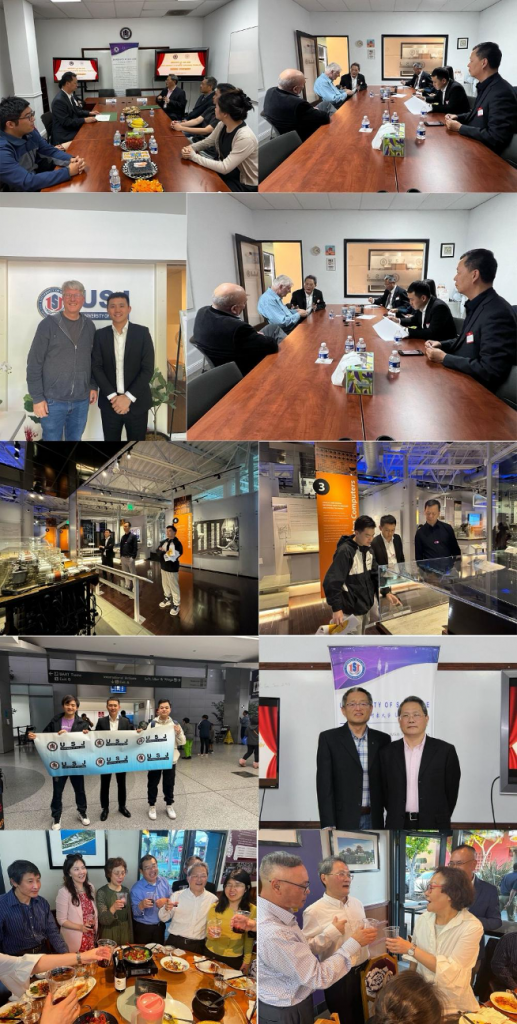
(Disclaimer: The content of this news article has been compiled by the author based on some recordings and notes. It has not been reviewed by the respective guests. Any errors or inaccuracies in wording are the sole responsibility of the author and do not reflect on the guests)
